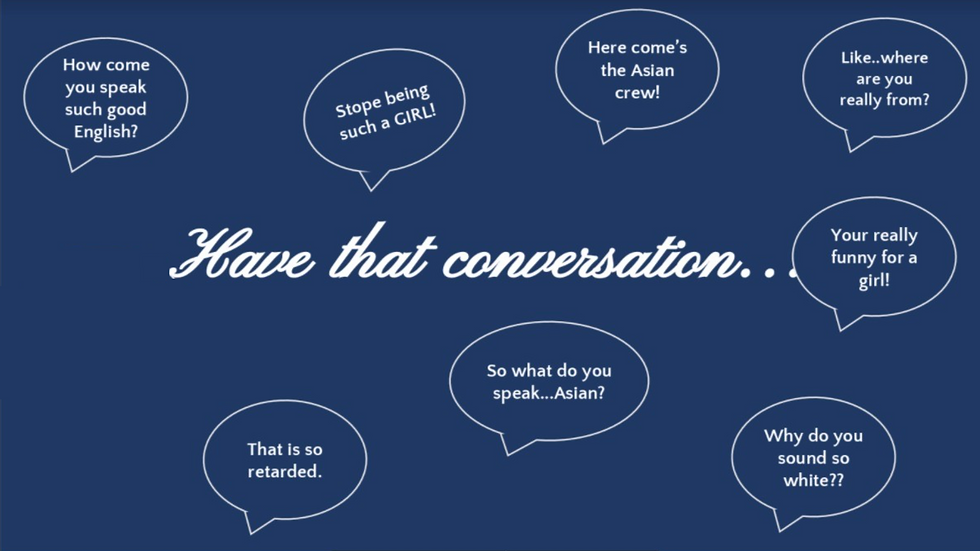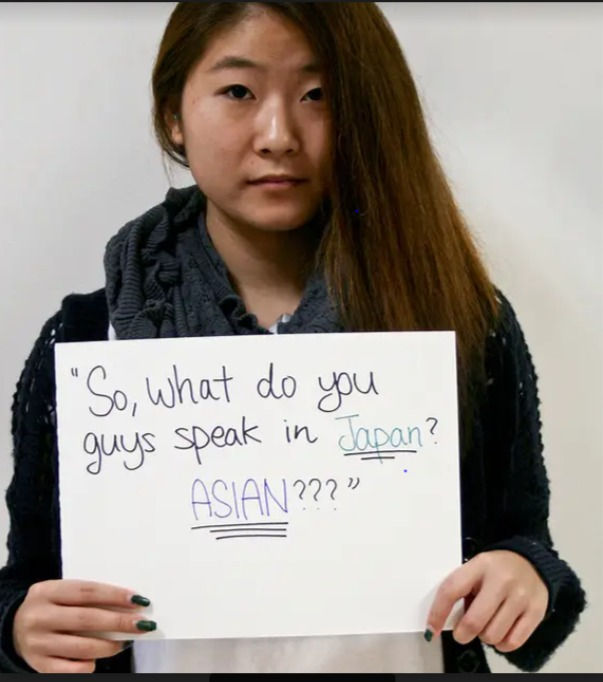Have that conversation…
- Krishnna Pratheesh
- Nov 8, 2020
- 4 min read
Updated: Nov 9, 2020
Malavika Ram
Grade 8A

When I decided to write about microaggression faced by youth today, I knew right away that it would need to start with my personal story, no matter how small or big. So at the risk of sounding like a wailing banshee, since there’s no better way to put this across, my first brush with microaggression was linked to the dark circles under my eyes (yes, I know I have them) and the lack of a smile on my face (which usually means I’m thinking).These relatively noticeable features that I wear on my face have prompted people to ask me very often, ‘Why are you so depressed?” or say, ‘‘You look depressed’. These experiences have led me to the conclusion that dark circles + no smile on face = depressed and edgy, and I seem to be the poster girl for this. Your very own Wednesday Addams.
Some of you reading the above may be wondering - why is she making this such a big deal? And to that I say, my journey is my truth. If it has affected me, I should at least start acknowledging. I’m sure these comments were made without the slightest intention of causing hurt, and I’ve probably unintentionally passed on a remark that’s insensitive too.

So what is microaggression exactly?
Originally coined in the 1970s by Chester M. Pierce, a Harvard psychiatrist, today’s definition of a microaggression can be credited to Derald Wing Sue, a professor of counseling psychology at Columbia University. Since 2007, he has written several books on microaggressions, including “Microaggressions in Everyday Life: Race, Gender, and Sexual Orientation.” In it, Dr. Sue writes that microaggressions are the everyday slights, indignities, put-downs and insults that members of marginalized groups experience in their day-to-day interactions with individuals who are often unaware that they have engaged in an offensive or demeaning way - (published in NY Times , 03.03.2020, written by Hahna Yoon)
Microaggression is the "subtle verbal or nonverbal insults or degrading messages communicated toward a marginalized person, often by someone who may be well-intentioned but unaware of the impact their words or actions have on the target " (ready.web.unc.edu)
The more we hear, the more we become aware… some slights cut deep.
"Fat people are the ones that don't leave food for African kids and those with mental illness are just seeking attention." All of that in one sentence, I felt attacked from all angles. After that we had an argument and they shrugged it off saying- "You just need to lose all that fat to actually think and understand that I'm right’’ - as shared by Anonymous, GIS student.
Surprisingly, a significant population among us student communities don’t seem to think this an important topic to address. Such comments have become so commonplace that a majority of us are left wondering if we are just making a big deal out of nothing. While I was hoping to engage more of my peer community and share their lived experiences such as the one above, I was also given some not so great feedback in the process like, ‘the topic is too boring”, “can’t be bothered”, “it’s pointless”, “it’s a waste of time” etc…But some of the world’s leading institutions don't seem to think so. The #itooamharvard photo campaign for example, is inspired by a play based on interviews with members of the black community exploring and affirming their diverse experiences as black students at Harvard College. That’s not a waste of time at all, is it?

Microaggressive comments heard often within the walls of G IS -
‘Your English is surprisingly good.’
‘Stop being such a girl.’ (If I asked you to stop being such a boy, how would you interpret it?)
‘What are you, a girl?’
‘Do all Indians speak Indian?’ (Oh my God...)
‘Oh look, here comes the Asian crew.’
‘That’s the whitest thing you’ve ever said.’
‘You’re so fat’ (this person said it jokingly to someone who isn’t overweight at all)
‘Why do you listen to this music? Are you a goth or something?’
And the list goes on…

So why is preventing and responding to Microaggression important?
It's really not that complicated. Research shows that this every day discrimination has strong consequences on an indivdual’s mental and phyical health. From forming negative self image, to distrust and suicidal thoughts, the trauma caused by microaggression can be long lasting. Simply put, it’s debasing, insensitive, and it needs to stop.
Dr. Joan Williams, our very own GIS MYP Counselor has shared some important tips to prevent students from experiencing microaggressions within or outside of school campus. She herself has faced microaggressions ranging from “You’re so articulate, there’s no way you’re from the South.”, to being told “here’s the deal’” in a very dismissive way.
Below is her advice on dealing with everyday microaggression -
‘‘Everyone has an opinion, however, be mindful of how you express your opinion in the presences of others
Recognize if you have used or been the victim of microaggression
Create spaces in the school culture (homeroom, student leadership meetings) to address microaggressions
Acknowledge cultural holidays and traditions of others as a way to embrace differences
Finally, have courageous conversations with your family, friends, teachers, and school leadership to see how microaggressions impact our communities’’
According to an article that appeared in New York Times, psychologists often compare microaggression to death by a thousand cuts. So the next time you want to say a comment or ask a question that may be borderline assumptious or offensive, think about who you’re talking to and what you're about to say. Don't be that 1000th cut. For those of you who are experiencing it or have experienced it in the past: bring it up. Speak up. Not standing up for yourself is accepting. All you need is just have that conversation.

Comments